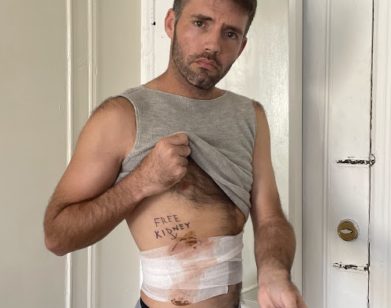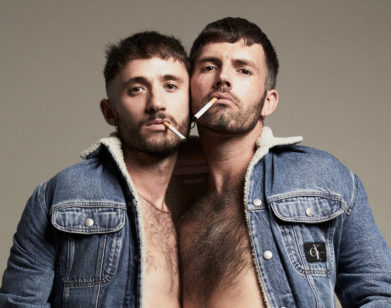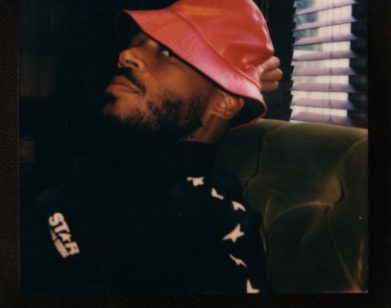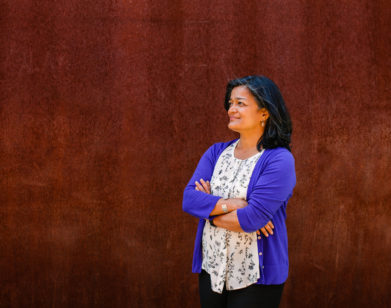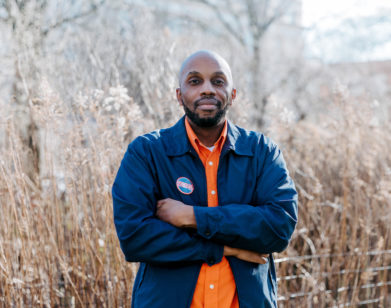A no-nonsense conversation between Alexandria Ocasio-Cortez and Kerry Washington
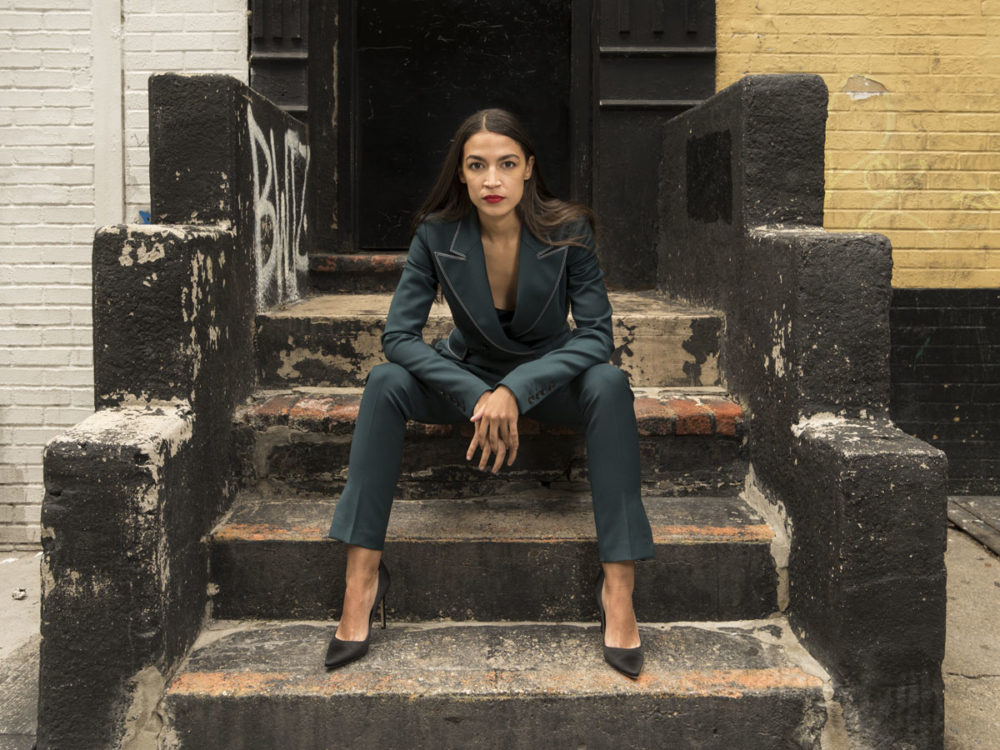
On the 26th of June, Alexandria Ocasio-Cortez sent shockwaves through cable news and beyond with her congressional primary upset of ten-term incumbent Joe Crowley. Now, as the country barrels toward the midterm elections, the 28-year-old Democratic Socialist’s campaign has become the playbook for how to effect change in a post–Donald Trump landscape: knock on doors, speak truth to power, and stand for what’s “right and good.”
KERRY WASHINGTON: It’s such a magical opportunity to get to speak with you. I feel so deeply connected to you because of our shared history in the Bronx. My grandmother and two of my maternal aunts both lived in Parkchester. I grew up in your district.
ALEXANDRIA OCASIO-CORTEZ: Oh my gosh! That’s amazing.
WASHINGTON: I remember reading an interview where you said you believe in working hard and leaving the rest up to the universe, that you didn’t even watch the polls as they were trickling in on election night. What is your connection to God and the universe?
OCASIO-CORTEZ: I really connect with Martin Luther King Jr.’s concept of a moral universe—the idea that we can operate within a moral framework and tap into something powerful. Growing up in a community that’s so diverse, I felt really blessed to see all the different ways that our community taps into that same idea. Among all of these faiths, there’s a shared faith that’s very powerful. So I didn’t watch the polls, because I knew that the best thing we could do is work as hard as we can for what is right and what is good. Something I mentioned at one of our rallies—and maybe it’s weird to mention this at a rally—is that we’re not entitled to the fruits of our labor. We’re entitled to the labor itself, but we are not entitled to say, “Well, I did this, so I deserve that.” You can’t get too emotionally attached to outcomes. For example, in your craft, there are people who say, “I want to act so I can be famous.” And then there are people who say, “I want to act so I can bring stories to life, and that work is the gift.”
WASHINGTON: I absolutely relate to this idea. I do what I do because I love to tell stories, and I never got into this just because I wanted to be famous. But I also want to make sure that people don’t misunderstand the idea, because I feel like there is a lot of anxiety around the word “socialism.”
OCASIO-CORTEZ: Yeah.
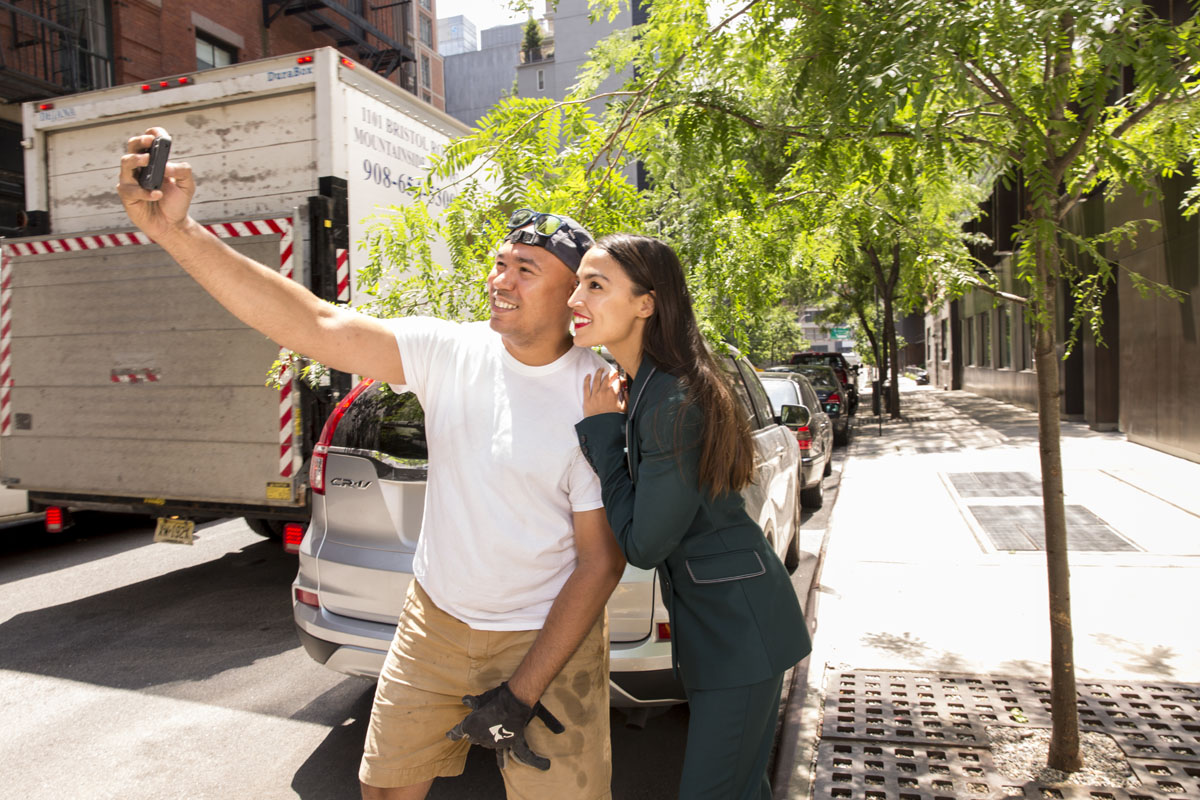
Blazer and Pants by Gabriela Hearst
WASHINGTON: I want to make clear that you’re not saying that all one can do is work, and one does not get to keep the benefits of that work. We all deserve the fruit of our labor. In fact, that’s why it’s a travesty in this country that so many people work so hard and never see the fruit of their labor because of how big businesses are constructed.
OCASIO-CORTEZ: I’d have to check this, but I remember reading that the average worker in the United States generates about $60 per hour worth of value. But the average hourly income is far, far lower than that. So we definitely struggle with that today, and it’s not enough to say, “I’m a good person.” The question is, “Am I doing good work?”
WASHINGTON: How do you define “good work”?
OCASIO-CORTEZ: For me, it’s about asking, “Am I serving the people around me? Am I doing my best to make their lives better?” And it doesn’t mean that I have to be perfect every single time, it doesn’t mean that I don’t make mistakes; but I think what it means is, “Have I made an active and conscious effort to make people’s lives better in my little pocket of the world?” One of the issues facing humanity is that our material technology is outpacing our moral technology. So I think that moving toward a more morally sophisticated society will allow us to have a more human society—one where people are able to feed themselves and house themselves.
WASHINGTON: What is your response to people who say that your approach isn’t pragmatic?
OCASIO-CORTEZ: I’m very idealistic about my ends and my vision, but I’m very pragmatic in how I get there. I am first and foremost a consensus builder. I’m not a top-down person, and I got elected bottom-up. We can’t accomplish anything until we get community buy-in. I’m not the G.O.P, where it’s like, “Okay, this tax bill was enormously unpopular, but we’re going to force it through anyway.” That’s not who I am. And I find that when we show people what we’re about and really spell it out, a lot of the time I’m able to persuade people who are initially skeptical. I think that we can build a country around an idea of basic economic dignity. I really do believe we can live in a healthy, functioning society where people feel comfortable in their ability to go to the doctor, send their kids to college, and save our planet from cataclysmic climate change. The magic is that it’s actually possible, and it’s not this pipe dream that everybody says it is.
“It’s not enough to say, ‘I’m a good person.’ The question is, ‘Am I doing good work?'”—Alexandria Ocasio-Cortez
WASHINGTON: I love the photo you posted of your shoes, with the caption, “Respect the hustle.” A friend of mine also saw it and said to me, “We have to get those shoes in the Smithsonian!” And I totally agree. But how do you deal with people who interact with you in a negative way, either on social media or at a press conference? How do you deal with the haters?
OCASIO-CORTEZ: For me, it’s really important to know whose opinions you value, because nine times out of ten, the people who are critiquing you are people who are never going to be in your camp. Some people are just like that, and it’s not worth the emotional energy to answer them. But it’s also really important for me to listen to the critiques of those who matter. When communities give me feedback, I value what they say. I’ve been knocking on doors and talking to people for two years, so I’ve talked to a lot of constituents who disagree with me on some policies. But I actually rarely find people, even Republicans, who disagree with me entirely. One text that has been extremely formative and informative for me is Howard Thurman’s The Search for Common Ground, in which he talks about how important this search for common ground is to the health of our society. No matter where you are on the political spectrum, I feel very confident in my ability to connect with folks. People can truly count on the fact that I will listen to them in a way that other people who are funded by lobbyists don’t, because there’s another interest there that complicates that relationship.
WASHINGTON: How do we embolden more people to let go of the power structures that prevent them from listening to each other?
OCASIO-CORTEZ: I think that one of the places we start is with our media. Our conversations are so shaped by being publicly angry and outraged at bad behavior. I don’t think we celebrate good behavior enough, or lift people up when they do the right thing. I think if we spend more energy rewarding good behavior, then we will get more of it. The only reason I was able to conduct my campaign is because of people who believed in me early on, irrespective of the political reality. They knew it was the right thing to do, so they gave their time, energy, and resources to support it, regardless of whether they thought I was going to win. Those are the types of morally courageous people who are going to really change the entire landscape.
.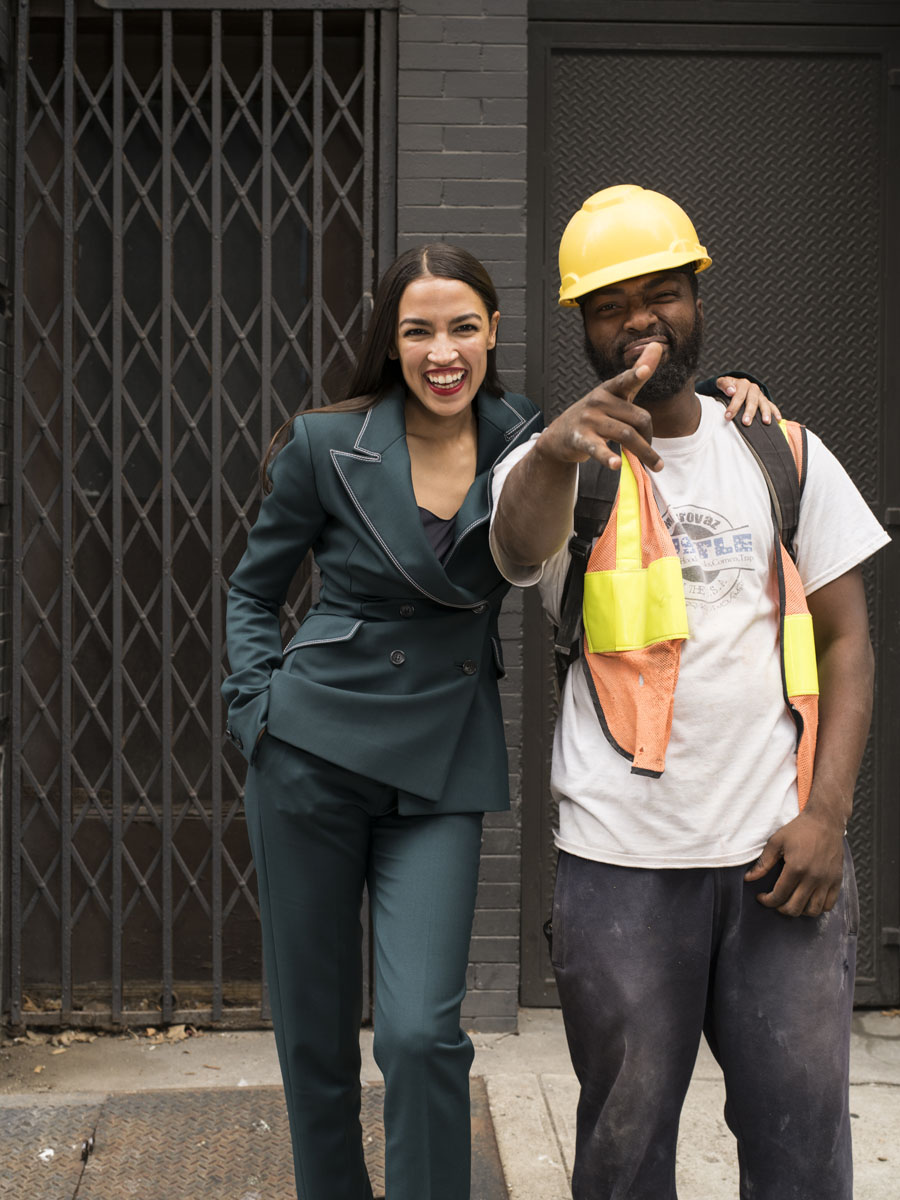
WASHINGTON: What are you focusing on now, leading up to the midterm elections?
OCASIO-CORTEZ: One of the things that we’re trying to do in the Bronx and Queens is register 20,000 voters between now and Election Day. We need to re-enfranchise our communities. People think that New York is a very liberal state, when it actually has some of the worst voter suppression laws on the books. One of the ways that we can change that is by enfranchising communities of color, communities that are working class, and making sure that everybody can vote. I would go into entire buildings that are six, seven, eight stories high, and there would only be two or three registered Democrats inside.
WASHINGTON: Why are all of those voters unregistered?
OCASIO-CORTEZ: In New York State, we have laws that make it very easy to get unregistered. If you don’t vote in a certain number of elections, you will get taken off the voter rolls. If you move—which in New York City happens all the time—your registration doesn’t follow you, and it takes a fair amount of time to update it. That’s why I think we need automatic voter registration as well as same-day registration. We also need early voting and mail-in ballots. All of those things can help solve these problems.
WASHINGTON: The platform that you speak from has expanded greatly. How are you adjusting to that?
OCASIO-CORTEZ: Well, it literally happened overnight. The race was called, and then every single major news outlet was contacting me. It’s something that’s going to take a long time for me to process, because I’ve spent the last two years knocking on doors in my community. I’m still coming to terms with the fact that what we accomplished in our backyard has resonated far beyond any expectation that I ever had. It makes me feel a tremendous sense of responsibility to steward that mindfully. But it definitely feels surreal. It’s really important for me to go to my bodega when I wake up in the morning, because they’ve known me for years. I wasn’t any different to them on June 26 than I was on June 25.
———
Styled by Malaika Crawford
Hair: Adam Szabo at Frank Reps
Makeup: Romy Soleimani at The Wall Group
Photography Assistants: Yoav Friedlander and Julianne Nash
Production Assistant: Lorena Rodriguez Ostia


